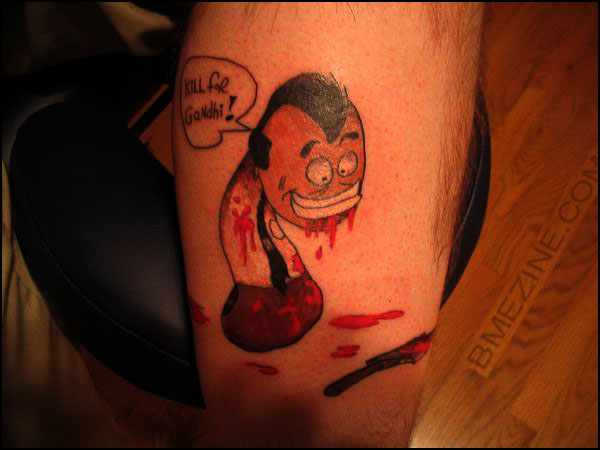
By J.P. Rotten, Alabama.

By J.P. Rotten, Alabama.
Would you shave my coin purse?
Double-click here to reveal See more in “Eunuchs“ (Male Nullo) (members only)
Earlier today I got an email from Ary over at VIMBY. They’d just done an interview with Shawn Barber, who I happen to think is the bees knees and so I wanted to share the first video with you. Shawn’s new book Forever and Ever is available from several places online, including the publisher that I linked to, and it is definitely worth picking up.
It also doesn’t hurt that Ary sent over a couple of videos about CanvasLA, with a segment about the gallery itself and another video featuring the opening of Guy Aitchison and Michele Wortman‘s Scratch Art show. It was an amazing collection of work from some of the best tattooers in the industry.
I posted the extra studio/city videos because I felt like these videos are much better than the various “Ink(ed)” shows on cable. They don’t give you the same manufactured lines that you hear over and over again which come off more like the producers feeding the stories to the people getting tattooed. Want to see more videos like these? Let me know in the comments section..
Welcome to BME’s Big Question! In this weekly (hopefully) feature, we’re going to ask a handful of the community’s best and brightest piercers, tattooists, heavy mod practitioners and shop owners for their opinion on one question or issue that’s affecting the body modification community. Many, many thanks to all of the contributors.
If you’d like to be a part of future editions, or if you have an idea for an issue or question you’d like to see addressed, please e-mail me.
This week’s topic:
* * *
 |
| Ryan Ouellette |
I refuse stuff all the time, or, more often, I ask people to book appointments a few days away. I don’t get picky with average piercings, but with the trickier stuff like microdermals, surface work, genital piercings or complex cartilage I really prefer the person to have some kind of understanding of the “risks.” If someone seems a little blurry on the details I’ll explain the basics of healing and aftercare and the chances of a problem coming up. If they seem to get it then I’ll either get them on the spot or have them book an appointment. If a person just gives me that blank stare when I explain something or is obviously trying to rush into something, I’ll usually tell them to research it more and come back at a later date. I understand that it’s their body and choice, but I don’t want to deal with a serious problem coming up because I valued someone’s money over my own reputation or ethics.
 |
| Joy Rumore |
I have not refused to do work based on the image to be tattooed, nor have I refused to work on someone because of differing beliefs. I’ve tattooed gang members, white supremacists, and a variety of unsavory characters in general. Few and far between are those I flat out refuse to work on, but they are out there.
Occasionally, a couple will come in where the woman is supposed to get the tattoo, but her husband/boyfriend is doing all the talking. It’s always the same set up: The man will describe how he wants the tattoo on her, what colors I should use, how it should be angled, how it will look most sexy, and she will just stand there looking nervous. The dude will make some snide remarks about me being a female tattoo artist and then expect me to carry out his every whim. When it is clear that she’s terrified, I walk past the man and ask the woman if she wants to get tattooed. There’s generally some shrugged response about, “Well, he likes it,” and zero eye contact. Then, usually when I turn to the man and announce, “She can come back when she wants to get tattooed, but I will not be tattooing her today,” insecure and dominating men don’t like it when a woman tattoo artist tells them how things are gonna be. Curses are shouted and they go away. No big deal.
Other times, I have refused to work on people based on their interactions with me and the “vibe” they’ve given off. In one of these cases, I ended up feeling threatened and unsafe.
Before I owned my own place, I worked at a shop in downtown Providence, Rhode Island. I had a customer approach me about doing two dog portraits. I was game, he was game, it seemed like it’d be a fun time. He brought some pictures in and we started to set up a date for the appointment. I also informed him at this time that he needed to bring in his ID and fill out paperwork on his appointment date.
He said that he didn’t give out information and he wouldn’t let me copy his ID. He raised his voice and continued that he didn’t do that kinda stuff, alluded to problems with the law, and said he couldn’t leave a trail and allow people to find him. I apologized and I told him that those were the state’s regulations I was required to follow and that I would lose my tattoo license if I did not comply. He got agitated. I repeated what the problem was and further explained that the paperwork doesn’t get sent to the state, but rather sits in a box, filed away, for seven years. He still was nowhere near happy with the situation. He raised his voice more and began to verbally turn his anger on me. After going over the same questions for another 10 minutes or so, I apologized again, and he finally left the shop all pissed off.
This is where it gets weird.
The would-be customer began to drive by the shop everyday very slowly. Sometimes he would park outside the shop on the street and just stare into the building. Sometimes he would get out of his car and lean against it just hanging out for no reason. After about a week of this behavior, he came back with the pictures of his beloved pooches in hand and he told me he wanted to get the tattoos done. I reminded him that I could not do the tattoos without ID and paperwork. He got agitated again. Began saying things that didn’t make any sense — almost like he was pleading his case. By this time, I had made my mind up that he was more trouble than he was worth.
I informed him that I could not do the tattoos. He conceded that he would get his ID and fill out the paperwork as long as I promised no one saw them. I said I couldn’t promise that because the Health Department has every right to come in and inspect them whenever they would like. I continued by explaining that I would not tattoo him at all. He was confused. I told him I was uncomfortable with the situation. I didn’t like him driving by being menacing, and that I was simply refusing to work on him, period.
I thought he was agitated before? Ha! He yelled at me, told me I couldn’t do that, stomped around, called me a few choice names, and finally left the building after I yelled back at him. He continued the weird drive-bys and hanging-out business for another week. I let all the guys I worked with and the business owners on the same block know what was up in case something escalated. It never did. He was creepy for a while and yelled things occasionally. Finally, he stopped hanging around and I never saw him again. I’m really happy I never did those tattoos and I have refused to work on people here and there who present the same sort of attitude.
 |
| Steve Truitt |
I have refused to do a lot of procedures over the years. Everything from people wanting their tongues pierced that are far too short for it to be comfortable for them and people with inappropriate navels wanting them pierced to people wanting far more extreme modifications.
If I don’t think the procedure has a good chance of working out in the long run, then I don’t do it. Also, if I think the procedure is too dangerous, or the person doesn’t fully understand what they are getting into, or the person is obviously mentally unstable I don’t work on them. There are also procedures I’m just not comfortable attempting even though I’m sure I have the skills to do them. For example, I’ve had a certain IAM member ask me on numerous occasions to do a penectomy on him. While I know that I could safely do that procedure, it’s not something I would ever attempt on anyone. I also wouldn’t amputate anything on anyone and have been asked to do that quite a few times as well.
All the procedures I do, I do because I like them — either how they look once they are finished, or doing the actual procedure. If I’m not into something, I don’t really have a desire to do it. I know of quite a few artists that are motivated by the money, but for all the more extreme mods I do, I don’t really care about the money. I do them for the pleasure of doing them and/or the end results. Because of that, I can’t think of any mods I’ve done to someone that I regret doing.
 |
| Allen Falkner |
Regret? Well, regret is a strong word. Yes, over the years I have made my share of mistakes, and no, not every modification I have done has turned out perfectly. This is true for any practitioner. However, I have always tried to work within my abilities. Not to say I haven’t done quite a bit of experimentation and exploration over the years. I have tried my hand at tattooing, scarification, implants, branding and various other things. In the end, I discovered piercing, suspension and now laser tattoo removal are my real passions and the other arts are best left to people that can devote more time to them.
As for refusal, the list goes on and on. In the early stages of my career, there was almost nothing I wouldn’t try. OK, maybe not the uvula. I remember when that piercing started to get a lot of notoriety. Do I think I could have pulled it off? Sure, but I felt the risks were too high so I left that one alone. In fact, I think it was that piercing that shaped me and made me realize that I had my limitations and should work within them.
This actually brings me to the real issue. One of the biggest shortcomings of the body modification industry has been and always will be ego. Not to say I don’t have one. We all do. It’s human nature. My point is that practitioners should work within their abilities and not let ego rule their decisions about what they can and cannot do. I’m not saying we shouldn’t push our boundaries. The only reason our industry has come so far is because of people constantly striving for the next great mod. It’s just that people should work within their abilities. Having every procedure imaginable on your resume might look good to you. But practitioners should really think about their client’s well being before attempting something that they’ve only seen on BME.
 |
| Meg Barber |
In this line of work, there are often occasions that arise where it’s best to not do a certain procedure on a client. Situations that immediately come to mind are those in which the client doesn’t have the proper anatomy to support the piercing that they are interested in, the client being intoxicated, the client being flat out belligerent in dealing with me or my staff, etc.
I’ve turned down scores of people over the years for those reasons, the most common one being anatomy related.
If I have a client interested in an industrial piercing who has no defined curl to the top of their ear, I will explain to them why that particular piercing isn’t the best option, and work with them to find one that is. And there’s always the classic issue of not having the best navel to support a piercing …
But I can’t say I have ever done a piercing I really regretted doing. I’ve always been pretty adamant about sticking to my guns when it comes to putting my client’s safety and successful healing first. I feel that as a piercer, we need to have the ability to say “no” to our clients when it’s warranted, and nine times out of 10, the client will appreciate it.
The thing I have noticed more and more in recent years, though, is the willingness to experiment on clientele for procedures that we aren’t sure of. It used to be, if there was a new or wacky thing you wanted to try, you did it on your roommate, or your lover, or on yourself … and those were pretty much your options. These days, it seems piercers are drawing from their client base for these experiments, and that is simply dangerous and foolish.
It really brings to the forefront the questions of, “When is it OK to experiment on clients?” and, “Why isn’t the word ‘no’ being used more in circumstances when it would be?”
The simple answer is a blanket “never.” A more in-depth answer would be, “When the procedure is in fact tested, just not in this particular situation.” A good example would be fully informing a client that they have a less than ideal navel for piercing, them insisting on having it done anyway, and then the piercer using a different placement to make it work. Remember all the 45* angled navels of the ’90s on those less than perfect navels? Case in point. No harm done really, just a little trial and error. And a few funky navel piercings as a reminder.
(The last answer, and the most common it seems in terms of today’s hot-shot piercers, is, “Always! I have ideas I need to test!”)
The next question that begs to be answered is, if clients are acceptable guinea pigs, then, specifically, which clients are the best for this?
Again, going back to basic answers, you have, “The heavily pierced client who is extremely careful and knows their body enough to understand what may happen,” who would be, of course, the best person for that role, and, “Who cares. If I tell the client the risks, and they still want it, OK.” Which is, of course, how it seems things go these days.
Personally, I will admit to playing around with different theories on how things will heal with clients. But — and there is always a “but” — I was very careful to only do things that were deemed “experimental” on clients that were heavily modified, who were fully informed, and whom I knew I would see often enough to keep tabs on the healing and any complications. Over the years, I have had three test subjects, and I saw all of them at least weekly.
We as piercers have a certain responsibility to uphold basic standards of ethics and morals with our job. We wield a lot of influence and power with our clients, and it needs to be used in a positive way — for positive education and helping the growth of our industry, rather than taking the risks presented to us to potentially destroy it.
Sometimes, “no” isn’t such a bad thing.
 |
| Derek Lowe |
I can’t wait to once again be labeled as “anti-modification” after I answer this question.
I choose not to do procedures (in my case, pretty much just piercings) on a semi-regular basis. While it is physically possible for me to pierce pretty much anything that walks through the door, that doesn’t always make it a good idea. There are a few reasons it might not be a good idea, but the most common one is simply the client’s anatomy.
The human body wasn’t created with piercing in mind, so not every person is well-suited to have every piercing. If I feel the piercing has a very small chance of working out, or I feel like it is going to cause “collateral damage,” I will opt to not do the piercing. One example would be someone who wants a surface piercing but has very little loose skin to work with. In that case the piercing is very likely going to reject and in most cases I’ll not do the piercing. Surface anchors are opening up some options in those situations, but even those aren’t the be-all end-all some people seem to think they are.
The most common situation in which I won’t do a piercing is if someone wants a tongue piercing but they have a very short tongue. With a very short tongue, the piercing is going to have to be done further towards the tip of the tongue. This is going to greatly increase the likelihood of the barbell doing damage to the gums and bone under the lower front teeth — collateral damage. Some piercers will opt to do the piercing at all sorts of angles to try and counter that issue, but those angles often don’t work and can lead to other issues. I feel it’s simply best at that point to not do the procedure.
Some will say that people have the right to do whatever they want to their body, as long as they understand the risk. That’s absolutely true…they do have that right. At the same time, I have the right to choose not to do the piercing. I am under no obligation to perform a procedure for someone if I think it is a bad idea. As a piercer, my number one responsibility is to do safe piercings. While there are risks associated with every piercing, most of those risks can be mitigated almost to the point of non-existence. If they can’t be mitigated, that’s when I have to make a decision about whether it’s best to proceed or not.
There are also the situations I think every piercer has to deal with: clients who are under the influence of who-knows-what, clients that seem to be mentally impaired, clients who are clearly being pressured into the piercing by a husband/wife/lover/friend etc. Those are often not pleasant situations to deal with, but handling stuff like that is part of what goes along with being a professional.
 |
| Stephen DeToma |
I think if you are a piercer working today and you are not willing to refuse a piercing, there’s something wrong.
The biggest contributing factor to me refusing to do work on someone has to be anatomy. Fair, thin brows and ears not built to support a traditional industrial piercing are fairly common and make up the bulk of my refusals. Telling someone they cannot get the piercing they want can be touchy, but it’s not hard to steer someone who may be looking for a traditionally placed industrial towards something similar. I’ve often turned to other ear work, daiths being my favorite, as well as placing industrials in anatomy that will support it using different jewelry such as curved barbells. Sometimes it’s hard to explain to someone who comes in with a friend why they are unable to get a piercing their friend is currently wearing, even when it’s painfully obvious to us. The call of, “She got it, why can’t ?I” is a common one and a reminder that, in one sense, we are not all created equal.
I’ve also refused to do many different things that are either out of my range of experience or my personal comfort zone. I’ve been approached by friends over the years looking for tongue splits and transscrotals, the former of which I think I could undertake but my lack of any real practical experience prevents me; the latter is something so far out of my range I don’t even consider it.
I think artists get a rush out of creation, be it from painting or writing, and are constantly striving to reach a new level. I think it’s this sensation that drives body piercers to become body modification artists, that is, broadening their base of procedures that they perform. I think a lot of it is a genuine need to create; piercing can be limiting in its scope of application and a passionate artist will strive to touch on new ground, though there are a great many still who seem to want to make these modifications to earn their stripes, make their bones. It’s like a kid who has to commit a crime to prove he’s down with a gang; that may be a bad analogy but it’s the first that springs to mind.
And so, because of these feelings, I reassess my desire to be a piercer. There is a ceiling that one reaches when doing this work and when it is reached, I think it helps to focus you on your work. Maybe that’s what inspires some people to step away from it and move into heavier modifications. Maybe that was their plan all along — who knows? I won’t fault them for their choices. But when someone comes to me looking for a meatotomy for example, I can refuse easily knowing that there is a lot I still want to work on in the world of piercing alone. Though heavier stuff interests me a great deal, presently, it’s not for me.
When I turn someone down, I try to be as clear as I can with them as to why I am doing so. Being honest and sympathetic lends a great deal to making sure that the person understands why they won’t be getting pierced. Sometimes it doesn’t click until I tell them that I would love to charge them $50 for what they want, but I just don’t believe that would be right. Turning someone down sometimes means that they will simply walk right down the street to the first person who will do the piercing for them, but if you’ve been forewarned and decide to go through with it anyway, you can’t say you weren’t warned.
I try to get to know the person I’m piercing before we get down to work, so that if a girl comes in looking for a facial piercing days before she starts soccer camp — knowing full well that it won’t fly with the coach — I can suggest she wait until the end of the season.
As I write this, I just had a young lady come in looking for a septum piercing. She had been through 12 reconstructive surgeries around her nose and lips since she was a baby. I had her come in and sit down so I could look at her, already thinking that this wasn’t going to work. After a few moments feeling around, it was clear what was left of her septum wasn’t going to be suitable to be pierced. She was pleasant and said she had expected as much and we began discussing other piercing options.
Juxtapose that with one of the biggest disagreements I’ve had recently: A woman came in with her husband and daughter looking for a navel piercing. She had had breast augmentation less than 3 months ago and had gone through her navel. I was not comfortable with the state of the tissue or the length of time she had waited to do the piercing so I asked her to check back with me at 6 months to see if it had changed, warning her that it may be up to a year before the tissue was ready. The short version of the remainder is, she interrupted two separate conversations trying to explain that she was willing to take the risk and by the third I had to explain to her that there was no way I would be doing the piercing for her that day. She threatened to go up the road to another studio in town and have it done there; I wished her the best of luck.
Threatening to visit another studio when I refused, I explained, was like a teenager walking into a bar, demanding a beer, being refused, and threatening to go to another bar if he isn’t served. It’s senseless. If another studio would like to take the responsibility for the piercing, answer the questions that are surly to follow and deal with the inevitable headaches that the client would provide (judging by her interaction in the studio) I can sleep well at night knowing that I refused her.
What do you think? Let’s hear it in the comments.
Please consider buying a membership to BME so we can continue bringing you articles like this one.
![]()
 |
| Photo source: Getty Images |
So, in its bi-monthly attempt to take the onion off its belt and prove how hip it is, the New York Times has published a piece on the ever-increasing acceptability of tattoos in the mainstream and it’s actually not so bad. There are a few predictably hilarious quotes, such as this reaction to Project Runway season three victor Jeffrey Sebelia’s large throat tattoo:
“I was, like, ‘Whoa.’ It wasn’t a prison tattoo. It wasn’t sailors or criminals. It was this real-life person that you saw being creative and successful, and it really affected your perception about who gets tattooed.”
So that’s a nice, positive sentiment. And, since it’s the New York Times, this has gotten some pretty heavy coverage all over the series of tubes. What say the Internets?
Jessica Grose, Jezebel: “We were already aware that tattoos have lost their taboo status because the Times keeps telling us. Over and over and over and over again. They want to make sure we know that moms and dads and heartbroken doctors and heartbroken writers and even the Jews are getting inked. After the jump, some passages from these taboo busting articles that show, once and for all, that getting a tattoo is about as transgressive as eating a donut (think of the transfats!).”
Michael M. O’Hear, Marquette University Law School Faculty Blog: “While the article has led me to reconsider that flaming skull I’ve always thought would look great on my forehead, I do note that ‘lawyer’ is not in the list of professions in which visible tattoos are becoming more common. I wonder, though, whether there are some outposts of the legal profession in which tattoos have become the norm, or are at least more accepted than in others. And is there a resource guide somewhere for inked-up law students letting them know which employers are tattoo-friendly and which are not? Maybe this should be part of the NALP form . . . .”
Ann Althouse: “Who knew you had to earn your neck tattoo? I’d have thought getting a neck tattoo as opposed to, say, one of those peeping-over-the-pantyline tattoos was a real demonstration of commitment. Ten (or more) years ago I stood in line at the University Bookstore behind a pretty young woman who had a tattoo on her neck of an old-fashioned, claw-footed bathtub — complete with the extended pipe and shower-head. ‘Poseur’ is not the word that crossed my mind.”
Half Sigma: “I think they have prole drift backwards. The higher classes are taking on the habits of the lower classes.
It still seems incredibly stupid to get a tattoo. What happens when they go out of style? It’s still not considered upper class. Why permanently prevent yourself from ever being upper class?
Nevertheless, I see many white people in Manhattan with white collar jobs and probably college degrees who have tattoos. I suspect that they are all voting for Obama. College gradautes with tattoos just has a left-wing feel to it, but I can’t pinpoint why. Normally, left-wing people have no qualms about hating low-class white culture like hunting and NASCAR. It’s a real shame that the General Social Survey has never asked any questions about tattoos.”
 |
This is obviously a delicate subject, so it’s with some apprehension that I even broach the topic, but the evidence is overwhelming and it must be addressed: Body piercings — the piercings themselves — are actively attacking Israeli citizens. Crazy, right? “But how could a piece of perforated skin with a piece of jewelry in it harbor any sort of political or nationalistic bent?” you might ask, but the facts are irrefutable. Exhibit A: an Israeli soldier died this week from complications following an infected tongue piercing:
A 19-year-old combat soldier who died at Haifa’s Rambam Medical Center on Monday as a result of complications of a tongue piercing he had done in July was a rare case [Ed. Note: Or so they would have us believe], but oral piercings commonly cause infections, according to experts in the Israel Defense Forces and Tel Aviv University’s School of Dental Medicine. […]
The victim of tongue piercing felt severe pain around his lips a week after undergoing the procedure. He went to the Emek Medical Center near his home in Afula and Bnei Zion Hospital in Haifa and was transferred to Rambam as his condition worsened.
He developed a dozen infections in his brain that had begun in his mouth. First he was in the neurology department, but then the soldier was transferred to intensive care.
And as if this transparent plot weren’t transparent enough, there’s this unconscionable attack on the children (THE CHILDREN):
A 14-year-old boy who underwent a piercing in his nipple is hospitalized in Safed and facing surgery to repair damage from a serious infection, Ziv Hospital said on Thursday. […]
It was not clear whether the high school pupil from the Galilee had received his parents’ permission in writing to undergo the piercing, which is required by law for anyone under the age of 16.
Dr. Yuri Weiner, deputy head of pediatric intensive care at Ziv Hospital, said the boy previously had other parts of his body pierced with the insertion of a ring, but doing so in his nipple caused a serious infection in the lining of his chest and that he would need intensive antibiotic treatment and surgery, which is disfiguring.
The moral of the story? Piercings are terrorist organizations that must be eradicated at all costs before they kill again. I am suspending posting on BME so that we can focus our attention on this urgent matter. Posts will resume immediately.
Soldier’s tongue piercing causes fatal infection, Nipple piercing in 14-year-old boy leads to infection and surgery [Jerusalem Post]
“I got this one as a tribute to all the people who get flash Kanji and really don’t know if it says what they think it should (note the question marks).
We had a Japanese kid getting tattooed and I had him draw it up. He said it would look cooler in Chinese so we went with that..”

By Ed Weston, Chaos Ephex (again!), Lapeer, MI.
These are portraits of my mother and father. We have a really weird relationship so my butt was the perfect spot. I know it seems weird, but my mom almost cried, and my dad (the king of no emotion) sent me a text message simply saying “You rock!”
Pretty much the best decision I ever made!

By Ryan Szadyr, Chaos Ephex, Lapeer, MI.
You’ll see a photo from this set (courtesy of El Verno – more on ModBlog) appearing on the cover of your favourite website soon, but until then here are some more from The Holy Mackerel/Visual Addiction crew..
See more in ““Suicide” Suspension“ (Ritual)